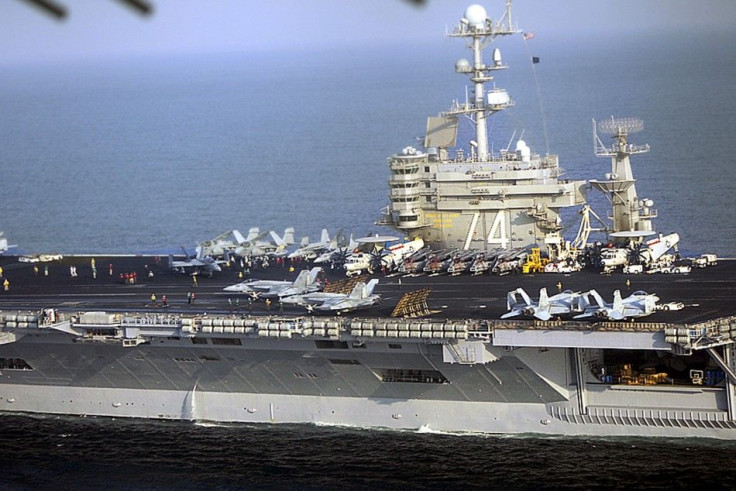Will U.S. End Up in War With Iran in 2012?

Many experts call the talk and actions from Iran a bluster. But the threats keep coming, begging the question: Will the U.S. end up in war with Iran in 2012?
The latest threat comes days after U.S. President Barack Obama signed into law sanctions against Iran's central bank which processes most of the country's oil-export payments. Obama and other leaders, including European Union foreign ministers set to meet in Brussels on Jan. 30 to consider a oil-export ban on Iran, hope more sanctions will slow the country from further developing its nuclear weapons program.
After firing three missiles during military exercises in the Strait of Hormuz this week, Iran warned the U.S. not to return an aircraft carrier to the Persian Gulf region. Using stern language, Iran's Maj. Gen. Ataollah Salehi reportedly said, The Islamic Republic of Iran will not repeat its warning, according to the state-run news agency IRNA.
Salahi further said Iran will not adopt any irrational move but it is ready to severely react against any threat.
The USS John C. Stennis moved last week from the Persian Gulf to the North Arabian Sea during Iran's war games drills over days in and near the Strait of Hormuz, the most vital passageway for oil tankers in the world. Iran has threatened to close the Strait with military action over the new sanctions.
The U.S. has no plans of responding to Iran's latest threat, and the Navy will certainly not disrupt any of its planned movements based on this latest threat, a senior military official told Fox News on Tuesday.
Another expert perhaps said it best regarding the threat and how America will react to it: You know darn well the U.S. is bringing their aircraft carrier back, so I think that puts Iran up against the wall, said Dominick Chirichella, analyst at the Energy Management Institute in New York, according to The Wall Street Journal.
Like many, Chirichella doesn't think Iran wants to get into a war. He said his own personal view is nothing is going to happen other than continuing bluster much like Saddam Hussein used to do in his day.
Sanctions Increasing Pressure
But we know what happened with Saddam Hussein and Iraq. America went to war, just recently leaving the country en masse after a nine-year occupation. Hussein was ultimately killed, but not without a heavy economic and troops toll from war.
The White House continues to make the case that Iran is bluffing. White House spokesman suggested Iran's latest threat shows desperation. He said sanctions are taking a toll against the oil-rich nation.
I think it reflects the fact that Iran is in a position of weakness, Carney said. It's confirmation that Tehran is under increasing pressure for its continued failures to live up to its international obligation ... This is simply a measure of the impact that sanctions have been having on Iran.
The U.S. has made it clear it does not want confrontation with Iraq. Rather, the U.S. wants Iraq to comply. But that may be easier said than done. Reports CNN: Iran said the ship's movement during Iran's naval exercises showed that the United States 'understood' that Iran's maneuvers were not 'suicidal or aggressive,' but rather about Iran protecting its own 'interests and power.'
But Western diplomats last week described the naval drills -- which, according to Iranian officials, included test-firing missiles -- as further evidence of Iran's volatile behavior.
Iran's Volatile Behavior
Volatile behavior. Experts assigned that to Hussein as well.
The big question now seems to be what will happen when the U.S. returns a carrier to the area Iran said it must stay away from. Iran may be accused of talking bluster, but the warning was stern by any assessment.
The U.S. has had forces in the Persian Gulf since World War II, however, and ships frequently pass through. And the U.S. Navy has made it clear that it won't take disruption suggested in the warning easily.
Anyone who threatens to disrupt freedom of navigation in an international strait is clearly outside the community of nations; any disruption will not be tolerated, said Cmdr. Amy Derrick Frost, a spokeswoman for the 5th Fleet, according to CNN.
© Copyright IBTimes 2025. All rights reserved.




















